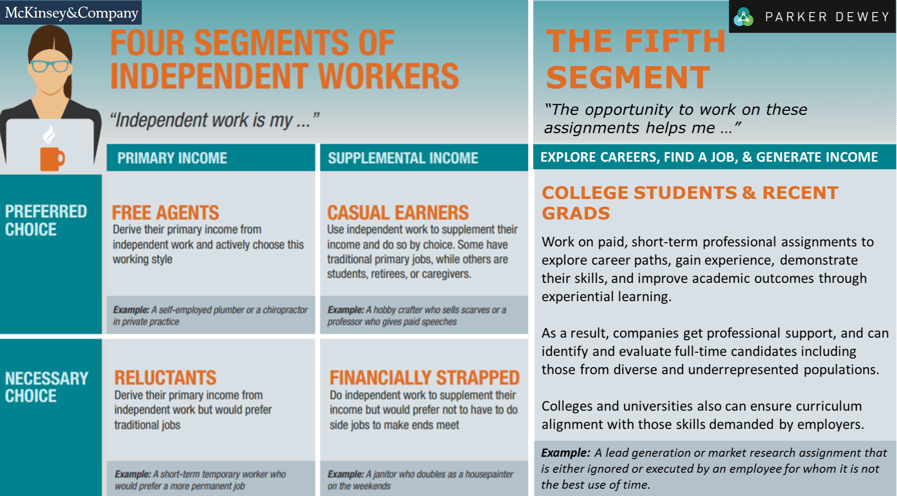
How the Gig Economy Will Save Full-Time Jobs
A version of this article was originally posted by Chicago SHRM.
Gigs and freelancing will never come close to replacing employee-employer relationships.
A few weeks ago I had the opportunity to participate on a panel regarding the gig economy and its impact on the future of work. During this session, a thought leader explained why the end of employer / employee relationships was near, showing data that 34% of the US workforce was already doing gigs.
She went on to describe the drivers of this shift. Specifically, on the demand side, companies were creating fewer jobs as a result of more efficient business models and view full-time employees as a last resort. At least this is not one sided, as she explained that the supply of full-time labor is also shrinking with the death of job security coupled with a desire by individuals to jump between companies.
While this perspective might help sell books and drive consulting engagements, the reality is that it is wrong. The gig economy will not ever come close to replacing employee / employer relationships. The experts who are making these predictions are interpreting the data incorrectly leading to the wrong conclusions.
That said, is the gig economy really that big of a deal?
Yes.
To be clear, it’s not a big deal because giggers will replace jobs or companies will no longer have employees. Rather, the real impact is that emerging freelance platforms provide companies a powerful way to not just address their immediate needs, but also to address their challenges around hiring effectives.
The cost of bad hiring
Irrespective of company size, industry, or geography, every HR professional is facing challenges around hiring effectiveness including sourcing, assessing skills, driving diversity, and retention. The costs of these challenges is massive with companies spending over $15 billion annually on campus recruiting only to face an additional $30 billion in annual costs associated with attrition of their millennial employees.
The reasons are not surprising. According to the SHRM / Mercer survey, only one in five employers is confident in its entry level screening process, most of which consist of interviews, resume reviews, assessments, and other tools. As reported by NACE, this is likely the result of employers seeking skills like leadership, teamwork, communication, and problem solving that are not captured on resumes or easy to assess through traditional methods. Furthermore, as the number of applicants increases for every job posted, companies increasingly rely on automated tools to filter candidates, thereby causing companies to all recruit the same individuals based on metrics (e.g. school, GPA, major) and miss out on those that might actually be a better fit.
However, the issue is not just on the company recruiting side. While there is some level of appropriate employee attrition related to career development, an increasing number of employees leave because (i) the fit was wrong to begin with or (ii) perception that the fit is better elsewhere. This is particularly acute for entry level professionals as both share the same cause: lack of context. In particular, millennials accept jobs with only one or two prior professional experiences, not nearly enough to understand if company, industry, or responsibilities are “right.” And while this has always existed, it is exacerbated by the massive amounts of information about other opportunities through social media and other sources (“the grass is greener” issue) coupled with the ease of one-click applications.
How gigs will save jobs
Fortunately, the gig economy provides a simple solution that addresses these issues in a way that companies and individuals both win. To be clear, the gigs have always been around – we just used to call them something else. When we needed someone to help file documents, answer phones, or provide other immediate support we would call the temp agency. Or if we needed very deep expertise on a specialized subject we would go through our Rolodex and find a consultant who could come by. Did we ever think about replacing our teams with perpetual temps or consultants? No.
Not surprisingly, today’s gig economy models are primarily playing in the same spaces: I need a less-skilled resource on a short-term basis (temps) or someone with very specialized knowledge for a defined question (consultants). Through technology, we can now look beyond our geography or network, accessing a broader set of resources and making it easier to get support especially for assignments that we would have had to do ourselves (but were not the best use of our time) or we couldn’t get done at all because we didn’t personally know the right resource.
In addition, traditional temp models relied on firms to source and screen talent which drove significant markups and high conversion fees. However, technology mitigated this need as companies and individuals can now easily find one another.
Finally, gigs allow both companies and individuals to look beyond their traditional targets. Because assignments have low cost, commitment, and risk, companies can explore candidates from outside of their historical hiring pools. In the same way, candidates are more willing to explore companies, roles, and industries they would not have otherwise considered as they can have a series of these gigs before committing to an internship or job.
Will the gig economy change the future of work? Without a doubt. However its impact will not be fewer job and fewer employees, but rather more of the right employees in the right roles.





